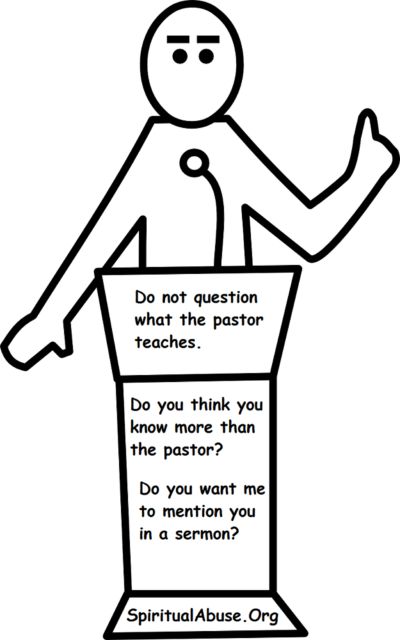Over the past few years, I’ve looked at several of the various oddities within this church, the conservative movement I was a part of, and Pentecost as a whole. No one would answer my questions for a long time. The answer was always to go ask the pastor. When I asked the pastor I was told that I was rebellious or thought I was smarter than him. I was expected to accept what was preached as gospel, and never look to the gospel or the God of the gospel for answers beyond the pulpit.
I hope these are anomalies- that they are not common in Pentecost. But the more I have read, the more I realize that I’m not alone in my experiences.
For a long time I refused to consider leaving the church, because they preached Jesus name baptism, Holy Ghost, and holiness of dress. But questions about other teachings started creeping into my mind. After two separate incidents, a year apart, when I was accused and charged guilty of something without being given a chance to explain (or in the second case to even know what they were talking about), I started looking into the scriptures more thoroughly. I stopped reading the Bible, but if something seemed strange, I’d reference the passage and read it in several versions if need be.
Several things began to disturb me:
- The belief that the pastor was always right, and that he could not be questioned.
- The concept that if the pastor said to do something, it must be done.
- Preference of one person over another.
- Letting down on standards held for decades, while still arguing that others (who used the same reasons for letting down on other things) were wrong.
- Making women lesser saints.
- Not allowing women to be as involved.
- Catch phrases that demanded a shout.
- Rebukes for not shouting on catch phrases, or not shouting enough.
- Meaningless songs with a few words repeated over and over and over and…
It’s sad, really. I didn’t want to leave, and I never thought I would stop believing certain things. I’ve wondered if I would have been better off if I’d left months or years ago when the problems started. I miss my church friends, but there weren’t that many of them. I miss church activities to a degree. But I’m not sad to leave.
I wonder what will happen now, where I’ll go or what I’ll do. Will there be a church I feel comfortable in? Where? When? Should I take time off from church or plow back into it? Should I go to a Oneness church or just let that go? Will I ever be able to marry now that I’ve left? Will I put too much emphasis on a new pastor, following the old, ingrained rules?
There are no answers to these questions, but I’m satisfied. At first after leaving I crammed on books about exit and spiritual abuse. I don’t feel like doing that now. Maybe I should- I’ve been told it takes years to work through the problems. Maybe I just wasn’t treated that badly, or maybe its just that somewhere I still believe that I’m not leaving God just because I walk out the doors of a particular church.
In that particular way, I feel miles ahead of the ministers and saints I’ve talked to. Almost all of them think I need a pastor and need this church. Not so. I need God. And my pastor is not my god, and my church is not my god. My God fills the universe, but also stepped into time and was crucified to a cross… and rose again. His grace is sufficient, and I’ll trust Him.







